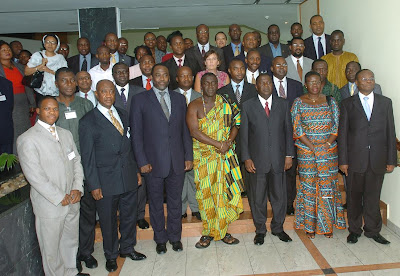May 17 of every year has been declared as the World Information Society Day by the United Nations. May be due to work committment, I do not know of any local event in

Today, I will like to share with you some of two of the things that has filled my thoughts and I am working on. We, as technical people, live in a society whose dynamics we must be conversant with. Time has gone for youths and those in early part of their careers to complain of marginalisation. There exist many opportunities for youths to use their career as a pedestal to contribute to the development of their society.
I share with you below two of the things I am connected with hoping to kick start an intellectual discussion on these.
1. The Internet Governance Process
The issue of Internet Governance, which you can understand as how and who should govern the internet, dominated discussions during the completed World Summit on Information Society. This has led to the birth of a separate process termed the Internet Governance Forum. The first of these forum was held in
As the Information Society has always acknowledged, the youths are taking a very active part in this process. Come to think of it, they will actually implement and bear the outcome. Youths' participation are in diverse ways through online and physical meetings. The first of those online discussion on the subject by youths was held from Nov 26 - Dec 16, 2006. Apart from my personal contribution to the discussion, I also fed outcome of the IG Workshop we had during our Young Expert Forum last December into the discussion as a body.
The IG process is ongoing and you can decide to build your capacity on the topic and contribute whenever the opportunity arise. At the IGF 2006, there was a session designated to Emerging Issues", which wad led by youths.
Here is a link to download a material which can enlighten you on the subject http://www.diplomacy.edu/ig
2. Technology and the MDG
World Leaders in the year 2000 adopted a set of goals, christened as Millennium Development Goals, that are supposed to be accomplished by the year 2015. This year marks the middle of the set deadline and attention are on appraising what has been achieved in the last seven years and projecting into the future.
Please visit http://www.unmillenniumproject
I think technology has a lot to play in the realisation of the MDG. I am doing a work on this and will like us to also engage each other if you have specific ways you feel technology can aid the MDG. My bias is ICT but it will be great to have people from other technological field to work with.
As we continue to make effort to develop ourselves, I am sure our preparation will always meet with opportunity.
Once again, Happy World Information Society Day.





